- Home
- A P Bateman
Stone Cold Page 11
Stone Cold Read online
Page 11
Stone smiled. “I usually trust a woman’s instinct,” he said. “I hear Katy’s father had his problems out there, his father before him. I understand Marvin worked with all of them, at some time or other.”
“A lot of guys work for a lot of mines,” she replied. “It’s a big state, but a small community. I guess most people have worked for Duke Tanner, for that matter. Marvin did too. There were times when he helped out in other mines, as well. He went back to work for Katy’s father, but there was the tragic accident soon afterwards, then Katy took over and Marvin stayed on to help her through.” Stone nodded. He tugged at the key and Maude released her grip. “Table tonight?” she asked expectantly.
“I’ll let you know,” he said.
Stone headed outside and to room twelve. It was getting dark, so he did not have much time to lose.
Chapter Twenty-One
Paris, France
He lived alone by choice. He had no sexual orientation or persuasion, but he was open to the fact that he probably once had, although he could not remember what that had been. But that would have been a long time ago, and he knew there were blockages in his mind, barriers by which he knew little of anything before his training and certainly no more than snippets from a childhood that was devoid of both compassion and comfort. Bereft of love. What memories he had presented only in dreams, and he was aware that they may not be memories at all, because as hard as he had tried, he could not conjure a memory at will. No mother, father, sister, or brother. No best friend, no bully. No school, no college. Nothing. Apart from the farm. That had been where the initial training had taken place. The training, the classroom, the scenarios. And then the training in the field. The killing in the desert, the plane ride home. Just a small private jet and two pilots up front. And then the missions. Blooded, tested, then utilized. He had worked all over the world and he had killed politicians, organized crime leaders and oligarchs alike. He lived frugally, just four apartments leased in his name – or his legend – in Washington, Paris, London, and Berlin, all chosen strategically, and all sparsely furnished with no personal possessions, and sanitized before he left for his next assignment. His salary was paid monthly into an offshore account, although he never used any of the money – his company expense card would take care of all he needed – and he had not been given access to the account for security reasons.
The apartment was above a boulangerie and a bar, which meant early starts for one business and late finishes for another. Hence the inexpensive rent. But it did afford a clear view of the Eiffel Tower and the Seine, which he reflected looked different from one day to the next. There was a reason so many artists had honed their craft in the city, the light, the dark, the thunderous clouds that could close a lid on the city, and the exquisite light on a fine day that could set it free. The noise factor did little to detract from the view. And views were important to his being, almost treating him with a mindfulness he could not find elsewhere. Not that he would ever talk about such feelings with his handler. He already knew that what he did, what his services provided, was neither socially nor morally acceptable. They had drilled that into him repeatedly at The Farm. But he also knew that what he did, reprehensible though it may be, was utterly necessary. He helped keep the world in check. Without him, and for all he knew, others like him, the United States of America, and its allies, would not be safe.
The text sounded and he took his eyes off the reflection of the early dawn sun on the Seine and looked towards the dresser. It was the only item on there and it vibrated and started to spin. As he stood up from the hard, wooden chair, he already knew who it would be. He had no other contacts and nobody else who would call. The text simply said, Washington ASAP.
He had the means to buy a ticket and he would reply to the text once his travel arrangements were in place, and then again when he arrived at Dulles Airport. He would then be given three hours to first run through anti-surveillance drills to check for a tail, then freshen up before meeting at one of five prearranged rendezvous points that were used on a rotation basis. And then he would go to work and an enemy of the state would die.
Chapter Twenty-Two
Stone had found an area of ground to park on fifty yards off the road that had alder and willow and young spruce to hide his truck from view. He cut a few switches with his folding Spyderco serrated-blade knife, the razor-sharp blade slicing easily through. He spread them over the roof and hood, more to stop the shine of a flashlight or headlights from the road, than to hide it from sight. He then cut a switch and pressed it into the ground on the edge of the road to act as a marker. He lined it up on a telegraph pole and a road marker opposite. That gave him a triangle of markers, so he would not struggle to find the truck later.
It was a three-mile hike to McBride’s Folly, and another mile to Duke Tanner’s claim. He had the .45 and a spare magazine in his jacket pockets and hung the shotgun over his shoulder on the makeshift sling. Alder was a favorite resting place of both brown and black bears, and he did not want to stumble on a sleeping grizzly underprepared.
The terrain was uneven and ridged underfoot, and Stone supposed that much of the ground had been mined over the years and had now been reclaimed by nature. Behind him, the Pacific coastline; ahead of him, the ridge of snow-capped mountains rose high and acted as a barrier to the interior of Alaska. It would be a different place in the winter, thought Stone. Every region had its own geological idiosyncrasies that produced gold. Here, it would be the seams in the mountains ahead of him. Fissures of gold exposed by erosion and washed downstream. On the coast, they mined the stuff using barges and giant vacuum pipes right off the seabed. The end of the line, a journey taking a million years or more from the snow-capped peaks reflecting in the moonlight.
Stone eventually found himself on a ridge overlooking McBride’s Folly. There were no lights. He had imagined them mining right on into the night, but he knew that later in the season the daylight would last until almost midnight and further north, there were eighty or more days where the sun did not set at all. Even so, there were arc lights and the vehicles had powerful headlights and spotlights that could have been used. Why had everyone gone home? Mining was a seasonal endeavor and depended upon people buying into the dream and going for broke.
The sheer scale of the mine lit only by the moonlight was considerable and he realized he had underestimated the task ahead of him. Getting across McBride’s Folly and onto Tanner’s claim would take more than thirty minutes, and the whole time he crossed the open ground, he realized he would be exposed. Silhouette was one of the key factors in camouflage and concealment – along with shine, sound, smell, and shape - and with the moon bright in the sky, anyone observing the mine would not fail to see him. There may well have been no lights, but that was not to say nobody was down there. Stone used the elevation of the ridge to traverse a shallow line of descent, much like a skier, and found the going easier as he maintained a slight angle to cover more ground. By the time he had dropped five-hundred feet, he was half a mile from the cabins and close to the far belt of trees marking out the northernmost end of the claim. Nobody would see him here, so he remained on the excavated ground and marched at a good pace until he reached the belt of trees on the west side of the claim. The forest was thick, but then Stone remembered Katy saying how it had not yet been excavated and tested, and that their focus had been on the other side of the claim. Which was what had drawn his attention to the west side. The land backed right onto Tanner’s claim, and if Tanner was so keen to buy a mined-out claim, then Stone was sure the samples that Katy McBride’s father had taken would be in this stretch of untouched forest.
The forest was thick and entirely overgrown with spruce. The trees were not huge, but this was gold mining country, and the land could well have been cleared years ago for access and reclaimed by nature. Stone estimated no more than twenty years of growth, judging by the ten-inch diameter trunks and twenty-feet of height. He trudged through, ever mindful of bears, but he wa
s sure they would be far away from the machinery and noise of the mines, probably scared off by guns if they wandered too close.
After a few hundred yards, Stone came to the edge to what was clearly Duke Tanner’s claim. Again, nobody was going for broke with night shifts, and the men clearly observed long daytime shifts. But there were lights on inside the cabins and trailers, so Stone stepped confidently out onto the heavily graded ground knowing that anybody up there would have had their night vision ruined by the ambient glow of lights, or if they were inside, would be completely night blind. As he drew closer, he could smell smoke and when he neared the camp, he saw the dying embers of fire and beer cans scattered where the men had gathered around the flames for a drink and to chew the fat after a hard day’s work. They appeared to have retired to their trailers and Stone could smell chili and cooked meat on the cold night air. There were other smells, too. Perhaps coffee and tobacco. Music played, interspersed with the sounds of various movies or distant laughter, and Stone imagined tired men kicking back, soon to be working another shift.
Stone worked his way past the vehicles. The workers had all parked in a line away from the mining equipment. Everyone owned a pickup truck, and he could see there were both old and new alike. But no Chevy Tahoe that matched the truck the two men had driven at the hospital shooting. Stone moved on, using the shadows and vehicles for cover. He crossed a hundred feet of open ground walking tall and steadily. There was no sense in crouching and running. Walking normally would not catch in somebody’s peripheral vision and if he acted casually and not suspiciously, then he could be mistaken for a fellow worker in the darkness. When he got into the shadows again, he edged along the machinery and headed for the cabins that acted as the mine’s offices, which were the first buildings people would meet on the drive in. As Stone neared the offices, he could see a large mound of tarpaulin. He crouched down beside the mound and lifted the corner of the tarp. It was secured by guy ropes which were weighted down by rocks. Stone lifted a couple of the rocks nearer to the mound and easily lifted the slackened tarp. As he suspected. He moved more of the rocks and dragged the tarp clear. The first truck was an old Ford, and it was beaten up badly. Stone worked his way around the front of it and saw the scuffs of yellow paint. The bumper was missing, but Stone would not have bet against it matching the paint and damage to Katy McBride’s Ford Bronco, and the debris at the scene of the crash being a match. Stone pulled away more of the tarp and instantly recognized the Chevrolet Tahoe that had tried to run him down at the hospital in Carlsson Sound. A neat bullet hole was in the center of the windshield and again, if the bullet was still inside the vehicle, Stone would not have bet against it matching the cop’s weapon, fired in retaliation before he was gunned down. Two for two. The opportunity was too good to miss, so Stone took out his phone and checked around him before taking a photograph of each truck, and in particular, the bullet hole and the scuffed yellow paint left by Katy’s Ford Bronco. The flash lit underneath the tarp like lightning, but he was confident the flash would not be seen further away. Nevertheless, he watched the trailers and cabins for a while before replacing the tarpaulin and kicking the rocks away to tighten the guy ropes.
Stone started back the way he had come but froze when the beam of a flashlight cut across his path. He dodged to his right and took cover behind an excavator, his hand gripping more tightly around the grip of the shotgun. The beam of light swept over the bulldozers and excavators in the row. Stone dared not move. The sounds of movement at night were greatly amplified, the stillness in the wilderness almost absolute.
The light skittered over the machinery, then played for a while on the tarpaulin. Stone froze, realizing that an edge of the tarp was still ridden up over the front bull bars of the Chevy. The flashlight turned to the offices and Stone used the change in direction to calmly cross the ground and step into the lee of one of the trailers. He glanced back and watched the light scrutinize the excavator where he had taken refuge, and then the man bent down and swept the beam underneath.
Stone had seen enough. He was not going to hang around long enough to see if he had been made. He turned around and headed back onto the plateau of lunarscape that made up the worked claim. When the darkness around him took on an ambient glow, he turned and looked back at the camp. Several trailers and RVs had their lights on, and more were flicking on by the moment as their occupants were being woken. Stone turned and ran for the edge of the claim, the belt of trees between Duke Tanner’s claim and McBride’s Folly would offer the cover he needed, but the ground he was now sprinting across was vast and exposed. The terrain was hard and uneven underfoot and he tripped and sprawled heavily. Winded and shaken, he rolled onto his side and saw the arc lights switch on, the camp illuminated like an evening game of baseball. Slowly, the arc lights started to move, and Stone watched as a quarter of the plateau behind him was turned into day, the light withering two-thirds of the length of the cut, casting shadows all the way to the trees. Stone struggled to his feet, picking up the shotgun and hobbling towards the boundary. His ankle and knee joints had stiffened and slowly loosened as he picked up speed. Behind him, the arc lights swept through the cut and fifty yards from the boundary, he was illuminated like the principal character on a stage. The first rifle shot kicked up dirt three feet ahead and to the right. That was an easy counter, so Stone darted right, slowed, then quickened his pace and dodged back left. Only more than one rifle fired this time and several bullets hit the ground around him simultaneously. He threw himself onto the ground and rolled, bullets passing overhead and pinging off into the trees. When he got back to his feet, he was nearing the edge of the light’s reach, but the bullets were still hitting the ground around him. Another push, near exhausted by the pace, and Stone reached the trees and kept pushing until he was fifty paces deep into the trees, before diving onto his stomach, and then rolling onto his back to inspect the muzzle of the shotgun. Blocking a shotgun’s barrel with mud or debris could prove catastrophic when the weapon was fired. The back charge as the burned powder, pressure wave and shot reached the obstruction and ruptured the breech or barrel could turn the weapon into a bomb and maim or kill the user as well as anyone standing beside them. Stone unloaded the weapon, upended it, then held his eye to the breech as he pointed the barrel towards the glow of the arc lights. The barrel was clear, so he quickly reloaded with the shells and got back to his feet. Behind him, he could hear baying dogs and urgent voices.
“You’d better run, gold thief!” a deep, Midwestern accent resonated through the night air. “That’s my damned share!”
Another voice screamed, “Trespassers don’t need no warning shots!”
Stone pressed on. Neither voice sounded like the two men he’d had the run-ins with, nor did they sound like Duke Tanner, for that matter. Stone imagined tough, innocent gold miners protecting their end of season bonus. If Duke Tanner suspected Stone had being snooping around, he could well have whipped his men into a frenzy. Perhaps even told them he had made off with a quantity of gold from the clean-up room. Stone did not want to harm innocent, though somewhat hot-blooded rednecks, but he wasn’t going to go down without a fight. He pressed on through the thicket and when he reached the cut on the side of McBride’s Folly, he turned back into the trees and headed north to circumnavigate the cut. Behind him, the dogs bayed more vocally, and Stone tore off his jacket, took out his knife and started to cut strips of fabric. He bent down and scooped up some dirt laden with stones and wrapped the debris in the jagged sheets and balled them up, tossing them further into the trees. He dropped a few pieces of fabric, too. Each time the dogs discovered the trail, it would take precious seconds for the handler to assess the find and command them to keep searching. Stone’s pace was slowed by the process of laying the false trails, but he had managed to get a few bundles deep into the woods and he balled and tossed his jacket out into the cut, then pressed onwards. After fifty or so paces, he turned back towards the edge of the cut and took cover crouched beside a
large spruce. In the ambient light from the distant glow of the arc lights on Tanner’s claim, Stone could see the bulk of his jacket twenty feet out in the open ground of the cut. The dogs were baying loudly, and the voices were excitable as the dogs leapt out into the cut and savaged the jacket, tearing and pulling it between them, to the shouts of commands to stop by the dog handler. The two men stepped out into the cut and were silhouetted by the glow of the arc lights. Stone estimated them to be sixty paces from him as they approached the dogs, then picked up the jacket and looked out across the lunarscape. One of the men pulled out a flashlight and swept it across the open ground. And that was when Stone fired.
The man with the flashlight went down, and Stone had the next shell chambered, the pump action sounding crisp and threatening in the silence that always follows a gunshot. The second man aimed towards where the gunshot and flash had come from, but Stone had already rolled to the side and the shot went wide as Stone aimed and fired again. The man went down, grabbing his shins and howling in unison with the first. Stone backed away and made his way through the trees. Sixty paces and the shot would have punctured the skin, but he doubted whether the lead would have shattered bone. Much of the shot would have been dispersed and he was confident no more than twenty pieces of lead shot would have hit the men’s legs. But it obviously hurt like hell, and they would both need medical attention in the form of tweezers, antiseptic, and gauze dressings, but not a whole lot more. A few days off work and they would both have a beer story forever more.
Thankfully, the dogs were scent hounds and not attack dogs, and the two men had wisely kept them back with them as they had struggled to their feet and limped their retreat into the tree line. Stone had traversed the steep incline and turned to watch the McBride’s Folly claim, and the arc lights of Tanner’s claim beyond. There were vehicles moving about and he could see men helping the two unfortunate trackers back across Duke Tanner’s cut. By now they would have an idea what direction he was headed in, and what the lay of the land was. The road from Tanner’s claim to McBride’s Folly looped around the fast-flowing river to a bridge five miles to the west. But Stone was parked on the next track over, and that track was only reachable by a fork road that led back to Lame Horse or up to McBride’s Falls. Stone knew that if he could get to his truck, he would travel parallel to the access road to the two mines and be in the clear.

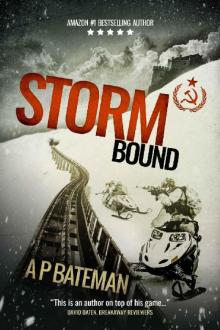 Stormbound
Stormbound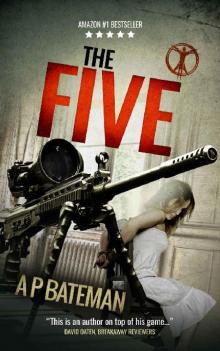 The Five
The Five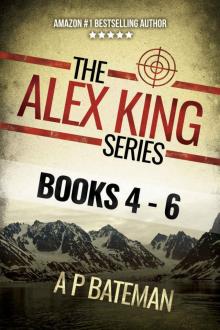 The Alex King Series
The Alex King Series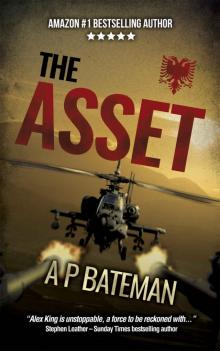 The Asset (Alex King Book 10)
The Asset (Alex King Book 10)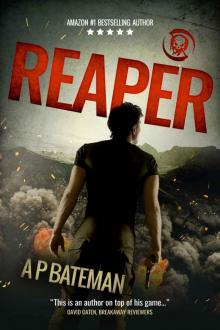 Reaper
Reaper Breakout
Breakout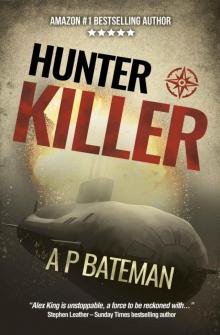 Hunter Killer - Alex King Series 12 (2021)
Hunter Killer - Alex King Series 12 (2021)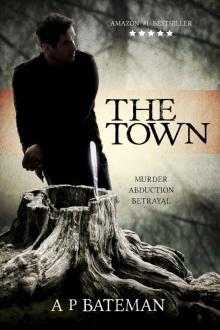 The Town (Rob Stone Book 2)
The Town (Rob Stone Book 2)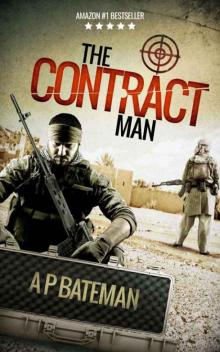 The Contract Man
The Contract Man The Island (Rob Stone Book 3)
The Island (Rob Stone Book 3)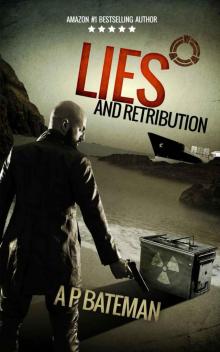 Lies and Retribution (Alex King Book 2)
Lies and Retribution (Alex King Book 2)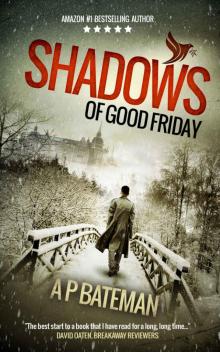 Shadows of Good Friday (Alex King Book 3)
Shadows of Good Friday (Alex King Book 3)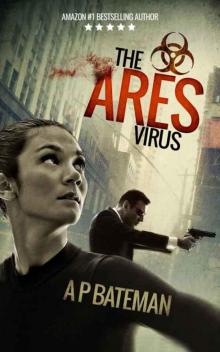 The Ares Virus
The Ares Virus